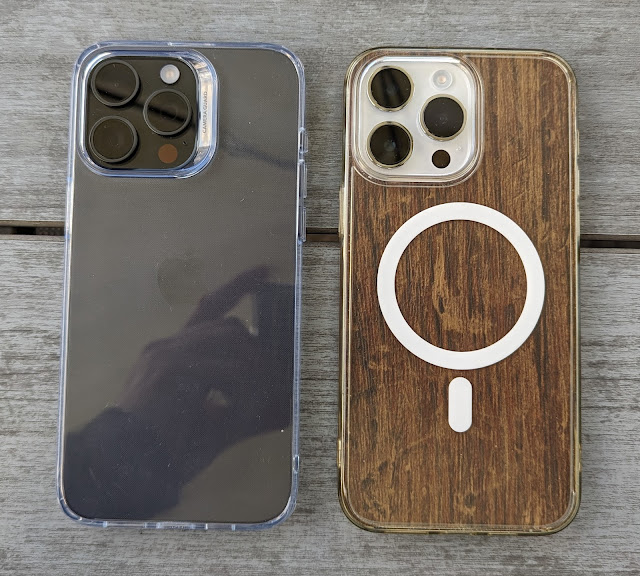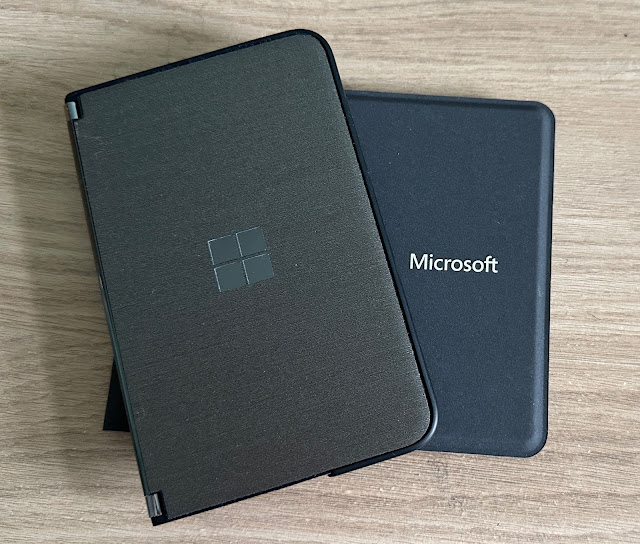One feature of the Android world over the last five years has been the reverse engineering of Google's first party Camera application, pre-installed in the company's Pixel devices. Popularly known as 'GCam', the resulting application includes all the multi-frame tricks that Google developed for its Google Glass project, wherein an ostensibly terribly low end camera could produce good results. By combining results intelligently from many captured frames, noise is reduced, detail is enhanced, and so on.
Available for free download in many places online, version by version, but start here, GCam can bring extra dimensions to low end camera modules in phones even today, though as the hardware has become better then the 'gap' between manufacturer and GCam results has become smaller and smaller.
In my case, I was thinking about using a GCam port on my 2021 Microsoft Surface Duo 2, whose main camera is impressive for its size and considering that it's primarily a business device. But could GCam improve its results even further?
When the Duo 2 was released, I'd have said certainly yes, since Microsoft's application was quite immature. But with a year of updates behind it, the Duo 2 Camera application has gotten better and better - fast and well tuned, and using many of the computational photography tricks employed by flagships.
So is GCam needed now, in early 2023? While this isn't a full imaging comparison piece and I've taken a few liberties, hopefully some of the data points here will help us decide.
For starters, and this applies to most phone cameras across the board, you almost certainly don't need GCam when shooting photos in good light. When you've got plenty of light, even with modest phone camera hardware, there's no need for multi-frame combination and noise reduction. As an example, here's a scene in winter sun, some ornamental solar buckets:
And here are 1:1 crops from the Duo 2's own Camera application and the 'LMC' variant of GCam, in its latest 2022 version), it's hard to see any difference whatsoever, even at the pixel level:
So let's turn our attention away from sunlight and think about having a GCam port such as LMC's in very low light, where the extra algorithmic expertise can make a difference.
Here's a shot of a car at night under a lamp (and a small note that I shot one of the photos the day after and the car had moved slightly on the pavement, so the crops show different ground and grass texture):
Again here are 1:1 crops from the Duo 2's own Camera application and the
'LMC' variant of GCam, in its latest 2022 version), in order:
Wherever you look in the frame, although the humble Duo 2 main camera is doing well, the GCam port does better, with more actual detail, more light 'gathered' (admittedly over a typical one or two second 'Night sight' exposure), though perhaps at the expense of contrast.
Let's try another example, a dramatic suburban scene lit by a number of warm street lamps (again shot on different nights, explaining different car and house light combinations, plus the GCam night was mistier):
Again here are 1:1 crops from the Duo 2's own Camera application and the 'LMC' variant of GCam, in its latest 2022 version):
Again very different handling of fine detail and contrast - I'm tempted to give this shot to GCam because of the better fine detail (despite the mist), which can be contrast-enhance later in an editor, while the Duo 2's shot is so 'contrasty' already that it would be hard to go back to something more natural. At the pixel level anyway, of course both are fine for social media posts. And with pros and cons for each, you could argue this example either way.
Another example scene, some graves in extreme low light, with just a weak bulb on the side of the church lighting up the path. The scene was far darker to my eyes than the photos make it seem here:
Here are 1:1 crops from the Duo 2's own Camera application and the 'LMC' variant of GCam, in its latest 2022 version), in order:
Although there's possibly finer detail in the GCam shot below, I have to award this one to the Surface Duo 2's default Camera, which takes its night shot in half the time and produces and brighter and more pleasing image.
OK, ok, one final example, and let's see if LMC's GCam port can redeem itself. Suburbia at night outside my house (and again the GCam version was the next day, so some cars had moved)):
And here are 1:1 crops from the Duo 2's own Camera application and the 'LMC' variant of GCam, in its latest 2022 version), in order again:
Yet again we see the same pattern. Finer and more intelligent detail in the GCam version (below), very impressive in fact from such humble camera hardware. While the Duo 2's version tries to enhance contrast and colour, with good effect as a whole, such as when posting to Facebook, but which breaks down in somewhat ugly fashion when you look at the 1:1 pixel level, as here.
Apologies again for shooting test shots on different nights. I hadn't actually planned this comparison at all, but I thought the shots and examples would make an interesting short article.
My conclusion is that, while GCam ports are fun to play with - and absolutely worth having installed 'just in case' - you don't need them on the whole, at least on phones with cameras of the Surface Duo's calibre. Which I'd describe as 'average'. I'm sure there are worse phone cameras out there that will need more GCam help, but for 99% of shots the Surface Duo 2 isn't one of them. Only the last, extreme low light landscape example above showed clear GCam superiority.
PPS. I haven't covered use of ultra-wide and telephoto, but these aren't recommended anyway in low light, since they'd produce results that are far too dark and noisy. Though, again, the LMC GCam port can be configured to use these extra cameras and then you're into a fun new ball game! Again, see Shane's videos.


















Comments